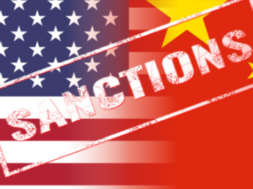
Roving Periscope: the US tightens screws with sanctions on China-plus
Virendra Pandit
New Delhi: There already were straws in the wind. In September, Chinese President Xi Jinping had turned down his US counterpart Joe Biden’s appeal for an in-person Summit, ‘unless America first rescinded’ some of its ‘anti-China’ decisions.
In November, the White House sent out invites for a virtual “Summit for Democracy” to nearly 110 countries—excluding Russia, and China, and other countries. The two-day Summit (December 9 and 10) concluded on Friday, Human Rights Day, paving the way for action.
And hours after President Joe Biden wound it up the US announced extensive human rights-related sanctions on dozens of people and entities of China, Myanmar, North Korea, and Bangladesh, and also added a Chinese artificial intelligence (IT) company, SenseTime Group, to an investment blacklist.
Left out of the Summit, a peeved Beijing’s week-long diatribe against the US included comments like “weaponizing democracy”, “the US democracy a weapon of mass destruction”, and even the claims that China is the “largest democracy.” This may have provoked swift action from the West.
Washington unveiled sanctions against “15 individuals and 10 entities” around the globe. The State Department also barred 12 people from traveling to the US, including officials in China, Belarus, and Sri Lanka.
Apart from the US, the United Kingdom, and Canada clamped sanctions related to human rights abuses in Myanmar, while Washington imposed the first new set of sanctions on North Korea under the Biden administration. It also targeted Myanmar military entities, among others.
“Our actions today, particularly those in partnership with the United Kingdom and Canada, send a message that democracies around the world will act against those who abuse the power of the state to inflict suffering and repression,” Deputy Treasury Secretary Wally Adeyemo said in a statement.
Predictably, China’s embassy in Washington denounced the US move as “serious interference in China’s internal affairs” and a “severe violation of basic norms governing international relations.” Embassy spokesperson Liu Pengyu said it would do “grave harm to China-US relations” and urged Washington to rescind the decision.
The measures are the latest in a series of sanctions timed to coincide with President Biden’s fresh announcement to take initiatives to bolster democracy around the world and support pro-democracy legislation in the US.
“This is going to help seed fertile ground for democracy to bloom around the world,” he said in a speech closing the Summit.
The Treasury included China’s AI firm SenseTime in a list of “Chinese military-industrial complex companies,” accusing it of developing facial recognition programs to determine a target’s ethnicity, especially for identifying ethnic Uyghurs Muslims of the restive Xinjiang province. Now, the company will fall under an investment ban for US investors, at a time it is set to sell nearly 1.5 billion shares in an IPO.
Over a million people, mainly Uyghurs and members of other Muslim minorities, have been detained in recent years in a vast system of labor and ‘re-education’ camps in Xinjiang. China denies abuses, but the US government and many rights groups accuse Beijing of carrying out genocide there.
The US imposed sanctions on two Myanmar military entities and an organization that provides reserves for the military. One of these, the Directorate of Defense Industries, makes weapons for the military and police that have been used in a brutal crackdown on opponents of the military’s February 1 coup against Nobel Peace Laureate Aung San Suu Kyi’s democratically elected government. She has just been sentenced to a term in jail.
Canada imposed sanctions against four entities affiliated with the Myanmar military government, while the UK imposed fresh sanctions against the military, which has killed over 1,300 pro-democracy activists since February, according to the Assistance Association for Political Prisoners (AAPP) monitoring group.
The Treasury also blacklisted North Korea’s Central Public Prosecutor’s Office, along with the former minister of social security and recently assigned Minister of People’s Armed Forces Ri Yong Gil.
It even targeted a Russian university for facilitating the export of workers from North Korea. North Korea has long sought a lifting of US and international sanctions imposed over its weapons programs and has denounced US criticism of its human rights record as evidence of a hostile policy against it. The Biden administration has repeatedly called on North Korea to engage in dialogue over its nuclear and missile programs, without success.
In Bangladesh, the US imposed financial sanctions on the notorious Bangladeshi police unit Rapid Action Battalion (RAB) and six of its officers for serious human rights abuses. A senior police officer, Benazir Ahmed, has been barred from entering the US because of his alleged involvement in gross violations of human rights.
The RAB, comprising members of the police, army, navy, air force, and border guard, is accused of over 600 enforced disappearances in the past 12 years, a similar number of extrajudicial killings, and use of torture, the media reported.
Founded in 2004, it was entrusted with internal security, intelligence gathering related to criminal activities, and government-directed investigations, according to the U.S. treasury.
The Treasury Department sanctions bar US citizens from conducting business with or making contributions to the sanctioned individuals and block access to any property they hold in the US.













